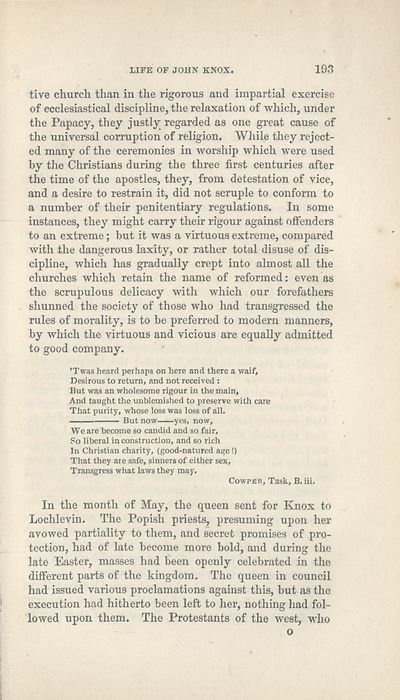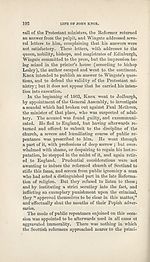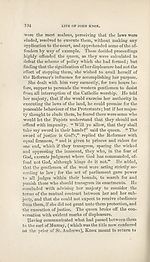Download files
Complete book:
Individual page:
Thumbnail gallery: Grid view | List view

LIFE OF JOHN KNOX.
193
live church than in the rigorous and impartial exercise
of ecclesiastical discipline, the relaxation of which, under
the Papacy, they justly regarded as one great cause of
the universal corruption of religion. While they reject¬
ed many of the ceremonies in worship which were used
by the Christians during the three first centuries after
the time of the apostles, they, from detestation of vice,
and a desire to restrain it, did not scruple to conform to
a number of their penitentiary regulations. In some
instances, they might carry their rigour against offenders
to an extreme; but it was a virtuous extreme, compared
with the dangerous laxity, or rather total disuse of dis¬
cipline, which has gradually crept into almost all the
churches which retain the name of reformed: even as
the scrupulous delicacy with which our forefathers
shunned the society of those who had transgressed the
rules of morality, is to be preferred to modern manners,
by which the virtuous and vicious are equally admitted
to good company.
’Twas heard perhaps on here and there a waif,
Desirous to return, and not received:
Hut was an wholesome rigour in the main.
And taught the unblemished to preserve with care
That purity, whose loss was loss of all.
We are become so candid and so fair.
So liberal in construction, and so rich
In Christian charity, (good-natured ago!)
That they are safe, sinners of either sex.
Transgress what laws they may.
Cowpkr, Task, B.iii.
In the month of May, the queen sent for Knox to
Lochlevin. The Popish priests, presuming upon her
avowed partiality to them, and secret promises of pro¬
tection, had of late become more bold, and during the
late Easter, masses had been openly celebrated in the
different parts of the kingdom. The queen in council
had issued various proclamations against this, but as the
execution had hitherto been left to her, nothing had fol¬
lowed upon them. The Protestants of the west, who
193
live church than in the rigorous and impartial exercise
of ecclesiastical discipline, the relaxation of which, under
the Papacy, they justly regarded as one great cause of
the universal corruption of religion. While they reject¬
ed many of the ceremonies in worship which were used
by the Christians during the three first centuries after
the time of the apostles, they, from detestation of vice,
and a desire to restrain it, did not scruple to conform to
a number of their penitentiary regulations. In some
instances, they might carry their rigour against offenders
to an extreme; but it was a virtuous extreme, compared
with the dangerous laxity, or rather total disuse of dis¬
cipline, which has gradually crept into almost all the
churches which retain the name of reformed: even as
the scrupulous delicacy with which our forefathers
shunned the society of those who had transgressed the
rules of morality, is to be preferred to modern manners,
by which the virtuous and vicious are equally admitted
to good company.
’Twas heard perhaps on here and there a waif,
Desirous to return, and not received:
Hut was an wholesome rigour in the main.
And taught the unblemished to preserve with care
That purity, whose loss was loss of all.
We are become so candid and so fair.
So liberal in construction, and so rich
In Christian charity, (good-natured ago!)
That they are safe, sinners of either sex.
Transgress what laws they may.
Cowpkr, Task, B.iii.
In the month of May, the queen sent for Knox to
Lochlevin. The Popish priests, presuming upon her
avowed partiality to them, and secret promises of pro¬
tection, had of late become more bold, and during the
late Easter, masses had been openly celebrated in the
different parts of the kingdom. The queen in council
had issued various proclamations against this, but as the
execution had hitherto been left to her, nothing had fol¬
lowed upon them. The Protestants of the west, who
Set display mode to:
![]() Universal Viewer |
Universal Viewer | ![]() Mirador |
Large image | Transcription
Mirador |
Large image | Transcription
| Antiquarian books of Scotland > Scotland/Scots > Life of John Knox ; and, The life of Alexander Henderson > (211) |
|---|
| Permanent URL | https://digital.nls.uk/131834836 |
|---|
| Description | Thousands of printed books from the Antiquarian Books of Scotland collection which dates from 1641 to the 1980s. The collection consists of 14,800 books which were published in Scotland or have a Scottish connection, e.g. through the author, printer or owner. Subjects covered include sport, education, diseases, adventure, occupations, Jacobites, politics and religion. Among the 29 languages represented are English, Gaelic, Italian, French, Russian and Swedish. |
|---|

